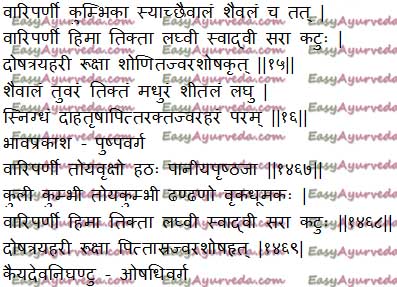Jalkumbhi – Water Lettuce (Pistia stratiotes) – Uses, Remedies, Research
By Dr Renita D’Souza
Jalkumbhi (Pistia stratiotes) is an Ayurvedic herb found floating on the surface of a stagnant water pond. It is used therapeutically to treat blood diseases, bleeding disorders, thyroid, piles, difficulty in urination, skin diseases etc.
Table of Contents
Remedies, qualities, uses
Traditional Remedies of Variparni
- Leaves decoction is used to relieve difficulty in urination (dysuria)
- Leaves are crushed, warmed and applied externally to treat piles.
- Plant ash is applied externally in headache.
- In goiter , plant ash is given along with cow urine.
- Plant juice is used for ear diseases by the tribal people in India called Mundas.
- Scalp ringworm, ash of the plant is applied externally.
- In chronic skin diseases, juice of leaves boiled in coconut oil is applied externally.
- Leaves infusion is used as a remedy in dropsy, diseases related to urinary bladder, kidney diseases, hematuria, dysentery and anemia.
- Oil extract of the plant is used to treat worm infestations, tuberculosis, asthma and dysentery. It is applied externally to treat skin diseases, inflammation, piles, ulcer and burns.
- In Gambia, the plant is used as anodyne for eye-washing.
Botanical Name – Pistia stratiotes
Family – Araceae (Arum family) (Surana kula)
Medicinal Qualities of Jal kumbi
Taste – Bitter (tiktha), Pungent (katu)
Virya (potency) – Cold
Qualities –
Laghu – light to digest
Ruksha – dry in nature
Sara – induces mobility, promotes bowel movement
Effect on Tridoshas
Balances all three doshas Vata, Pitta and Kapha dosha
Traditional Uses of Kumbhi
Blood disorder
Fever
Shosha – muscle wasting,emaciation
Pittasra – bleeding disorders
Part Used
Whole plant, Ash
Morphology, dose, Sanskrit verse
Morphology
Pistia stratiotes is an aquatic plant. It is found floating on the surface of water in lakes, ponds, streams etc. Leaves are soft, thick, light green, 14 – 15 cm long, no stem, and form a rose like arrangement. Flowers are small, hidden amongst the leaves.
Water lettuce removes nutrients and heavy metals from the sewage sludge and drainage ditches.
Dose
Juice – 12 – 24 ml
Powder – 2 – 8 grams

Interaction with medicines, supplements
Can this be used while taking Homeopathic medicine?
Yes. This product does not react with homeopathic medicine.
Can this medicine be continued while taking supplements like multivitamin tablets, Omega 3 fatty acids etc?
Yes. Generally, this product goes well with most dietary supplements. However, if you are taking more than one product per day, please consult your doctor for an opinion.
With western
medicines
Seek your
doctor’s advice if you are taking this product along with other western
(allopathic / modern) medicines. Some Ayurvedic herbs can interact with modern
medicine.
If both Ayurvedic and allopathic medicines are advised together, then it is
best to take Allopathic medicine first, wait for 30 minutes and then take the
Ayurvedic medicine.
Research, Controversy, vernacular
Research
1. Phytochemical and pharmacological activities of Pistia stratiotes (read)
2. Antinociceptive and Antidiarrhoeal activity – A study was done to investigate antinociceptive and antidiarrhoeal activity of methanolic extract of the leaves of Pistia stratiotes. The extract showed antidiarrhoeal activity on castor oil induced diarrhea in mice. Antinociceptive activity of was tested by acetic acid-induced writhing model in mice and the extract produced significant writhing inhibition. Thus the results of the study concluded significant antinociceptive and antidiarrhoeal activities of methanolic extract of the leaves of Pistia stratiotes.
Controversy over Kumbhika
Eichhornia crassipes is considered as a bigger variety of jalkumbhi i.e badi jal kumbi.
Name of Jalakumbhi in different languages
Hindi Name – Jal kumbhi, kumbhi
English Name – Water Cabbage, Nile cabbage, tropical duckweed, water lettuce, shellflower
Gujarati Name – Jalshamkala
Assamese Name – Borpuni
Bengali Name – Takapana, Tokapana
Kannada Name – Anthara gange
Malayalam Name – Kodda-pail
Manipuri Name – Kabokang
Marathi Name – Gondala, Jalamandvi, Prasni, sherbala
Tamil Name – Agashatamarai, Akayat-tamarai
Telugu Name – Akasatamara, Antara tamara
Urdu Name – Jalakumbhi
Pharmacology, chemistry, distribution
Pharmacological Activity of Pistia stratiotes
Diuretic, anti diabetic, antidermatophytic, anti-fungal, antimicrobial antiseptic, anti tubercular and antidysenteric.
Root is laxative, emollient and diuretic.
Chemical Constituents
Pistia stratiotes contain Oxalic acid, ascorbic acid, erythorbic acid, galactose, or glycolate.
Distribution
Pistia stratiotes is found in tropical and subtropical regions of Asia, Africa, and America. It is found throughout India
Medicines, synonyms, category
Ayurvedic medicines with jalakumbhi as Ingredient
1. A-Kof Syrup – It is an Ayurvedic medicine used to treat acute and chronic bronchitis, respiratory disorders, all types of cough, nasal congestion, and sneezing.
2. Ayrofit Syrup – It is an Ayurvedic medicine used as a general tonic. It rejuvenates the body.
3. Karna Bindu Ear Drops – It is used in the treatment of earache, otorrhea, tinnitus, and other ear disorders.
Sanskrit Synonyms of Kumbika
Variparni, Kumbhika,
Vaarimuli, Samulika
Toyavriksha, Hata,
Kuli, Kumbhi, Toyakumbhi
Tantana, Vrikkadumaka
Classical Categorization
Bhavaprakasha Nighantu – Pushpa Varga
Kaiyadeva Nighantu – Aushadi Varga
Scientific Classification
Kingdom – Plantae
Division – Magnoliophyta
Class – Liliopsida
Order – Alismatoles
Family – Araceae
Genus – Pistia L.
Species – P. stratiotes
Click to Consult Dr Renita D’Souza
Sthanika karma (Action on different system)
External application – Anthelmintic, Promote wound healing, indicated in Skin disorders. Juice is used to apply in wounds to prevent bleeding. Leaf paste on wounds helps to reduce burning sensation, Ashes prepared out of it are used in itchy skin rashes.
Digestive system – It has mild laxative action. Indicated in constipation, bloody diarrhea .Circulatory System – Ashes prepared out of this plant have Anti inflammatory action.
Respiratory system – Helps to eliminate vitiated kapha dosha. Indicated in cough, Asthma, rhinitis etc.
Excretory system – Increases urine output, indicated in Dysuria
Tapakrama – Jvaraghna and dahaprasamana (Indicated in fever associated with burning sensation.
Satmikarana – Promote body strength










